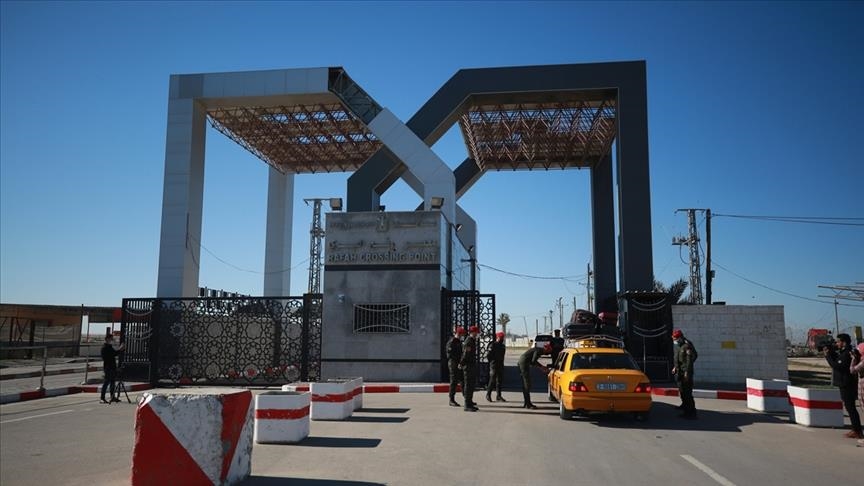Egypt’s closure of Gaza terminal ‘message of protest’ to Hamas: Analysts
Experts say Egypt seeks to pressure Hamas to respect truce with Israel

GAZA CITY, Palestine
Egypt’s closure of the Rafah border crossing with the Gaza Strip is a “message of protest” to Palestinian resistance group Hamas, Palestinian analysts said.
On Sunday, the Egyptian authorities closed the Rafah crossing with Gaza until further notice.
The move came one day after clashes between Palestinian protesters and Israeli forces along Gaza border during a rally to mark the 52nd anniversary of the burning of Jerusalem’s flashpoint Al-Aqsa Mosque.
At least 41 Palestinians and an Israeli soldier were injured in the clashes. In response, Israeli warplanes launched a series of airstrikes against Hamas positions in Gaza.
Palestinian media outlets affiliated with Hamas reported that Hamas political chief Ismail Haniyeh was in contact with Egyptian officials regarding the latest developments in Gaza, without further details.
Rafah is Gaza’s only crossing to the outside world that is not controlled by Israel.
Since 2007, Israel has imposed a crippling blockade on the Palestinian territory, badly affecting livelihood in the seaside enclave.
Strong relations
Speaking to Anadolu Agency, Hamas spokesman Abdul-Latif Al-Qanou said relations between Hamas and Egypt are "strong, stable and solid", noting that the two sides have engaged in “uninterrupted” contacts.
While he stopped short of revealing Egypt's position on the popular activities which caused the escalation along the Gaza-Israel border, Al-Qanou said Gaza residents “have the right to exercise pressure to extract their legitimate demands, and they have no choice but to break the siege."
Daoud Shehab, a leading member of Islamic Jihad group, hailed Egyptian efforts “to ease the burdens on Gaza", ruling out the possibility of Rafah closure being linked to the escalation of Palestinian protests.
“Egyptian-Palestinian relations are historic and will not be affected by malicious attempts to disrupt them," Shehab told Anadolu Agency.
Message of protest
But Ibrahim al-Madhoun, a political analyst and head of the Turkey-based Femed Media Corporation, believes that the Egyptian-sponsored truce between Hamas and Israel “has begun to falter”, considering the closure of the Rafah crossing as “a message of protest from Egypt to pressure Hamas to return to the truce track."
"This message is directed either to the unresponsive occupation [Israel] in the course of the truce or to the factions in Gaza that have decided to escalate their popular activities," al-Madhoun told Anadolu Agency.
On May 21, Egypt brokered a truce between Hamas and Israel to end 11 days of Israeli bombardment in the Gaza Strip that killed at least 260 Palestinians and injured thousands.
Thirteen Israelis were also killed by Palestinian rocket fire from Gaza.
In late July, Hamas said the truce negotiations between Gaza and Israel were faltering because of what Husam Badran, a Hamas leader, said was the new Israeli government’s “lack of political experience and internal differences.”
Al-Madhoun believes that the factions in Gaza are "determined to bring an end to the 15-year-old siege", which has been tightened further by Israel as seen in its obstruction of allowing Qatari financial grants, electricity projects, and other aid projects meant to support the residents of Gaza.
"I think that the resistance groups insists on escalating the state of popular activities in order to maintain pressure on Israel so that it responds to the Palestinian demands," al-Madhoun said.
Closure won’t last
Al-Madhoun thinks Egypt’s closure of Rafah terminal “will not last for long” citing previous commitments made by Egypt’s spy chief Abbas Kamel during his recent visit to Gaza that the crossing will not be closed and the siege will not last.
He also said that Egypt is keen not to appear as if it is in cahoots with Israel in imposing the siege while also warning that prolonging the closure might cause further escalation by the resistance factions.
For his part, political analyst Abdul Majeed Swailem said the reasons for the closure of the crossing “are not clear” which he said could be for "technical" or "political" reasons.
However, he did not rule out Egypt’s “displeasure with some of the behavior of the factions in Gaza” along the border with Israel.
"The reason for the closure may be to pile pressure on Hamas so that its behavior corresponds with Egypt regarding the truce," he said.
But Swailem expressed confidence that the closure of Rafah crossing “will not lead to a rupture between Hamas and Egypt.”
"These problems are not considered the end of the relationship,” he said. “They are solvable."
*Writing by Ibrahim Mukhtar in Ankara
Anadolu Agency website contains only a portion of the news stories offered to subscribers in the AA News Broadcasting System (HAS), and in summarized form. Please contact us for subscription options.







